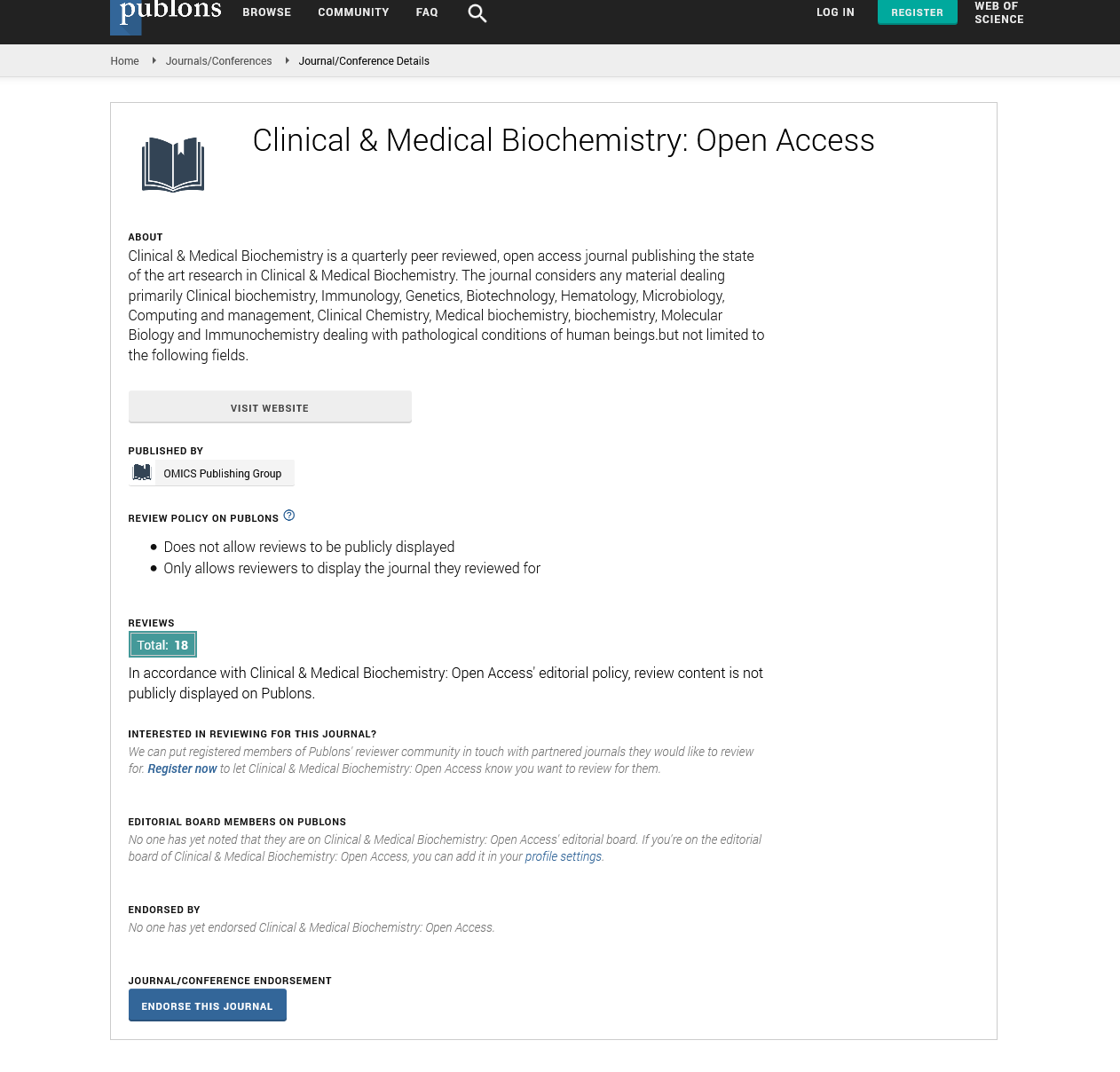Indexed In
- RefSeek
- Directory of Research Journal Indexing (DRJI)
- Hamdard University
- EBSCO A-Z
- OCLC- WorldCat
- Scholarsteer
- Publons
- Euro Pub
- Google Scholar
Useful Links
Share This Page
Journal Flyer

Open Access Journals
- Agri and Aquaculture
- Biochemistry
- Bioinformatics & Systems Biology
- Business & Management
- Chemistry
- Clinical Sciences
- Engineering
- Food & Nutrition
- General Science
- Genetics & Molecular Biology
- Immunology & Microbiology
- Medical Sciences
- Neuroscience & Psychology
- Nursing & Health Care
- Pharmaceutical Sciences
Short Communication - (2023) Volume 9, Issue 6
Clinical Trials: Bridging Science and Patient Care in the Pursuit of Medical Progress
Yuki Ito*Received: 23-Oct-2023, Manuscript No. CMBO-23-24111; Editor assigned: 26-Oct-2023, Pre QC No. CMBO-23-24111 (PQ); Reviewed: 14-Nov-2023, QC No. CMBO-23-24111; Revised: 21-Nov-2023, Manuscript No. CMBO-23-24111 (R); Published: 28-Nov-2023, DOI: 10.35841/2471-2663.23.9.195
Description
Clinical trials stand as the basis of medical research, serving as a pivotal bridge between scientific discovery and improved patient care. These carefully designed studies are essential for evaluating the safety and efficacy of new treatments, interventions, or medical devices. In the ever-evolving landscape of healthcare, clinical trials play an important role in advancing medical knowledge, shaping treatment protocols, and ultimately enhancing the well-being of individuals around the globe. A clinical trial is a systematic investigation designed to answer specific questions about the safety and efficacy of a medical intervention. These interventions can range from new drugs and vaccines to medical devices, behavioral therapies, and treatment protocols. Clinical trials follow a rigorous protocol or plan, outlining the study's objectives, methods, participant selection criteria, and the schedule of assessments [1].
Phases of clinical trials
Clinical trials are typically conducted in several phases, each serving a distinct purpose in the research process.
Phase I: This initial phase involves a small number of healthy volunteers and aims to assess the safety and dosage range of the intervention. Researchers closely monitor participants for adverse effects and determine the optimal dose for further study.
Phase II: In this phase, the focus shifts to a larger group of patients who have the condition for which the intervention is intended. The primary goals are to evaluate the intervention's effectiveness, further assess safety, and gather preliminary data on its potential benefits.
Phase III: Phase III trials involve a larger and more diverse patient population, providing a more comprehensive evaluation of the intervention's safety and efficacy. These trials often include a comparison with existing standard treatments to determine the new intervention's relative effectiveness.
Phase IV: Also known as post-marketing surveillance, this phase occurs after the intervention has received regulatory approval. It involves monitoring the intervention's long-term safety and effectiveness in a larger population over an extended period [2].
The significance of clinical trials
Advancing scientific knowledge: Clinical trials contribute significantly to the body of scientific knowledge. Through rigorous experimentation and data collection, researchers gain insights into the mechanisms of diseases and the potential benefits and risks of novel interventions.
Innovation in treatment: Clinical trials are instrumental in introducing innovative treatments to the medical landscape. New drugs, therapies, and medical devices that undergo successful trials have the potential to revolutionize the standard of care, offering more effective and targeted approaches to managing various medical conditions.
Evidence-based medicine: The findings from well-conducted clinical trials form the basis of evidence-based medicine. Healthcare professionals rely on the results of these trials to make informed decisions about treatment options, ensuring that patient care is grounded in scientific evidence.
Patient access to cutting-edge therapies: Participation in clinical trials provides patients with access to cutting-edge therapies that may not be available through standard treatments. This not only benefits individual participants but also contributes to the overall advancement of medical science.
Regulatory approval: Clinical trials are a prerequisite for obtaining regulatory approval for new interventions. Regulatory agencies, such as the U.S. Food and Drug Administration (FDA) and the European Medicines Agency (EMA), carefully review the results of clinical trials before granting approval for a new drug or medical device to enter the market [3-6].
Challenges in clinical trials
Recruiting and retaining participants in clinical trials can be challenging. Factors such as eligibility criteria, geographic location, and patient preferences can impact recruitment rates. Researchers employ various strategies, including community outreach and patient engagement initiatives, to enhance participation. Clinical trials are resource-intensive endeavors that require substantial funding and time. The high costs associated with conducting trials can be a barrier, particularly for smaller research institutions or innovative therapies with limited financial backing. The use of placebos in clinical trials raises ethical concerns, especially when effective treatments already exist. Striking a balance between rigorous scientific methodology and ethical considerations is an on-going challenge in trial design. Despite thorough pre-clinical testing, unforeseen adverse events can occur during clinical trials. Managing these events, ensuring participant safety, and communicating transparently with both participants and the public are essential components of responsible trial conduct [7-9].
The future of clinical trials
Advancements in technology, data analytics, and patient engagement are shaping the future landscape of clinical trials. The integration of digital health technologies allows for remote monitoring of participants, enhancing data collection efficiency and reducing the burden on participants. Wearable devices, mobile apps, and telemedicine platforms are increasingly being incorporated into clinical trial protocols. Real-world evidence, derived from sources such as electronic health records and patient registries, is gaining recognition as a valuable complement to traditional clinical trial data. This approach provides insights into how interventions perform in real-world settings, beyond the controlled environment of clinical trials. Emphasizing patient-centricity in trial design involves incorporating patient preferences, needs, and experiences into the research process. This approach not only enhances participant engagement but also contributes to the relevance and success of clinical trials. Adaptive trial designs allow for modifications to the trial protocol based on interim data analysis. This flexibility can lead to more efficient trials, quicker identification of effective treatments, and a more dynamic response to emerging findings [10].
Conclusion
Clinical trials represent the linchpin of medical progress, bridging the gap between scientific discovery and practical healthcare applications. These meticulously designed studies contribute to our consideration of diseases, drive innovation in treatment modalities, and shape the future of patient care. As the field continues to evolve, addressing challenges, ensuring ethical conduct, and embracing technological advancements will be essential to maximize the impact of clinical trials on global health. Through the dedication of researchers, collaboration across diverse stakeholders and the commitment of participants, clinical trials will continue to drive medical advancements, ultimately benefiting individuals and communities worldwide.
References
- Issa AM, Phillips KA, Van Bebber S, Nidamarthy HG, Lasser KE, Haas JS, et al. Drug withdrawals in the United States: a systematic review of the evidence and analysis of trends. Curr Drug Saf. 2007;2(3):177-185.
[Crossref] [Google Scholar] [PubMed]
- Maro JC, Platt R, Holmes JH, Strom BL, Hennessy S, Lazarus R, et al. Design of a national distributed health data network. Ann Intern Med. 2009;151(5):341-344.
[Crossref] [Google Scholar] [PubMed]
- Fleming TR. Current issues in non‐inferiority trials. Stat Med. 2008;27(3):317-332.
[Crossref] [Google Scholar] [PubMed]
- Strom BL. Potential for conflict of interest in the evaluation of suspected adverse drug reactions: a counterpoint. J Am Med Assoc. 2004;292(21):2643-2646.
[Crossref] [Google Scholar] [PubMed]
- Tsiatis A. Methodological issues in AIDS clinical trials. Intent-to-treat analysis. J Acquir Immune Defic Syndr. 1990;3:S120- S123.
[Google Scholar] [PubMed]
- Steinbrook R. Protecting research subjects—the crisis at Johns Hopkins. N Engl J Med. 2002;346(9):716-720.
[Crossref] [Google Scholar] [PubMed]
- James WP, Caterson ID, Coutinho W, Finer N, Van Gaal LF, Maggioni AP, et al. Effect of sibutramine on cardiovascular outcomes in overweight and obese subjects. N Engl J Med. 2010;363(10):905-917.
[Crossref] [Google Scholar] [PubMed]
- Foddy B. A duty to deceive: placebos in clinical practice. Am J Bioeth. 2009;9(12):4-12.
[Crossref] [Google Scholar] [PubMed]
- Mello MM, Studdert DM, Brennan TA. The rise of litigation in human subjects research. Ann Intern Med. 2003;139(1):40-45.
[Crossref] [Google Scholar] [PubMed]
- Fontanarosa PB, Rennie D, DeAngelis CD. Postmarketing surveillance: lack of vigilance, lack of trust. J Am Med Assoc. 2004;292:2647-2650.
[Crossref] [Google Scholar] [PubMed]
Citation: Ito Y (2023) Clinical Trials: Bridging Science and Patient Care in the Pursuit of Medical Progress. Clin Med Bio Chem. 9:195.
Copyright: © 2023 Ito Y. This is an open-access article distributed under the terms of the Creative Commons Attribution License, which permits unrestricted use, distribution, and reproduction in any medium, provided the original author and source are credited.

